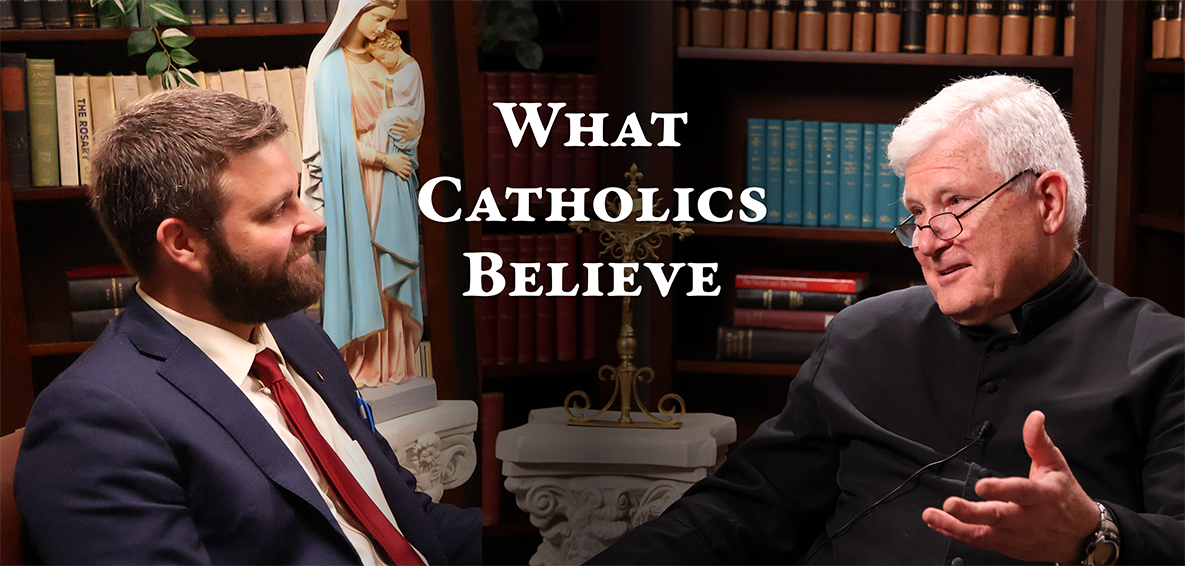Catholic Faith vs. Modernist Myth

The Catholic Church understands "faith" to be the supernatural virtue which enables the human intellect to assent, purely on the authority and veracity of God Himself, to the truths which God has revealed. It is by the power of this virtue in the soul that we believe with absolute certitude that God is three distinct Persons in one Divine Being, the Blessed Trinity of the Father, the Son and the Holy Ghost. We believe in the Incarnation of the Second Divine Person, the Son of God, we believe in His sacrificial death for us on the Cross, and in His continued Presence as man on earth in the Holy Eucharist, through which He enables us to be present at His Sacrifice renewed in the Mass and to receive Him in Holy Communion.
This is utterly different from the Modernist concept of "faith." For the Modernist, faith is a unique "experience" in which the individual "encounters" the Divine through his personal "religious sentiment." When he then strives to communicate his experience to others he finds that language is inadequate to fully represent the "truth" of his personal experience/encounter. The Divine manifests itself in various — even contradictory — ways to different people. All such experiences are "true," and thus the varying experiences have given rise to various religions, which all are "true" but none is adequate to represent the infinitely-faceted "Divine." For the Modernist, there can be no such thing as "one true Faith."
Modernism, which is really a form of the ancient pagan belief called Gnosticism, rejects the idea of unchanging doctrine and prefers to express itself in myth. Myths are stories couched in terms of imagery and hyperbole. Myths derive from human experiences expressed in worldly cultures and they change (evolve) with those cultures. Myths are fluid, not fixed—the Modernist would say they are "living” and, therefore, changing "traditions." Francis, the current world spokesman for the Modernists has even stated: "Change is the tradition of the church." We must bear in mind, however, that Francis speaks of, and for, the Modernists, not the Catholic Church. Myths are human inventions. The Catholic Church does not invent myths, but teaches doctrines of Divine Revelation. The truths of Catholic doctrine are not mere metaphors and allegories. They are forthright statements of permanent truths revealed by God. Our Lord Jesus Christ spoke in parables, but He also spoke solemnly in unchanging and nonnegotiable doctrine: "Amen, amen, I say unto you..."
The essential myth of Gnosticism—the "gnosis" or special knowledge of the "enlightened ones (the Illuminati) - - is that mankind is, in, fact, god. In every human being there is "the spark of the Divine," and those who know this are "spiritual" (not religious). They are the ones who are ready to graduate from this world and reclaim their divinity. The rest, those who are materialists who care about the body, and those who are religious and care about the soul, must continue this earthly existence until they finally recognize their own divinity, become spiritual and thus qualified to accede to their true, divine nature. All the various Gnostic mythologies, whether ancient or modern (e.g. Mormonism), begin with this occult knowledge and develop from there myriad fanciful narratives, some quite complex, about how we ("gods" that we are) came to be humans in this world. The coming one-world religion, now taking shape before our very eyes, will pretend to unite mankind around this myth that humankind is the only true "god."

